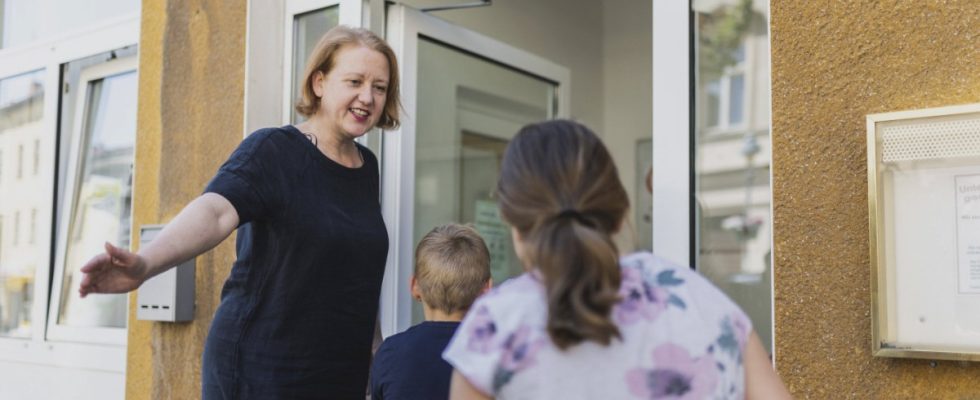When Federal Minister for Family Affairs Lisa Paus (Greens) stepped in front of the cameras in Berlin on Friday afternoon, she informed the journalists present that she had now given her draft for basic child security to early coordination – the Chancellery and Ministry of Finance can now bend over the concept and the ability to approve it explore. However, Paus did not want to provide any information on the contents of the draft, and the paper was also treated as a state secret by other members of the traffic light coalition.
The first reports about the contents of the draft circulated over the weekend; in the meantime he is lying there too Süddeutsche Zeitung before. In the 90-page paper, which reflects the status of August 11, Paus assumes that 3.5 billion euros will cost her basic child security in the first year. “The total costs for the period from January 1, 2025 to December 31, 2025 are 3.5 billion euros,” says the draft. And then, in square brackets: “The calculated costs are based on known data and performance levels for the year 2023 and have not yet been extrapolated to the following years.” The costs will be updated in the course of the departmental coordination, “as soon as the planning horizon in the departmental group is united”. Which means: As soon as Paus and Federal Finance Minister Christian Lindner (FDP) have agreed on how much money can be available in the household for basic child security.
According to the draft, basic child security should be based on the model that Paus had already outlined in the first key points. The basic idea is to bundle the “previous financial benefits child benefit, citizen benefit, social assistance, child allowance and the benefits of the education and participation package” – in the basic child security. Of course, not all children get the same benefits.
All families receive the guaranteed amount, the additional amount only to needy families
Accordingly, a guaranteed amount that is independent of income is planned, which corresponds to today’s child benefit and which all children and young people should receive. In addition, for needy families, there is an income-related additional amount that is graduated according to age. This is intended to replace the previous child allowance that families with low incomes currently receive and which prevents these families from slipping into the citizen’s allowance. The third building block are the so-called “benefits for education and participation”, which are currently still a separate item and will in future also be part of the basic child security system.
“All three components together contribute to securing a child’s subsistence level,” says the draft. The idea behind the bundling is that families only have to apply for one benefit – and not several as before. So far, only a few families have accepted the full benefits to which they are entitled. The result: in these families, the subsistence level of the children is not covered.
However, there is also a major difference in the draft compared to the previous group of beneficiaries. So far, the child allowance has only been available to families with at least a low income – i.e. in which at least one parent is gainfully employed. In this way, gainful employment should remain more attractive for these families than switching to basic security, i.e. citizen income. Now, however, the previous “minimum income limit” and the non-receipt of citizen money as a prerequisite for the child allowance are to be dropped.
According to the draft, the additional amount should be made up of the child’s age-related standard needs and the corresponding amount for accommodation and heating – minus the part that is already covered by the guarantee amount.
The benefits for education and participation are to be paid out with an additional 15 euros per month, as well as a “school supplies package” of currently 174 euros per year – however without a separate application, but automatically with the application for the additional amount.
Help for school trips, lunch or tutoring can be added – in the form of vouchers, direct payments from the authorities to the respective providers or as cash payments. However, such services must still be applied for.
In addition to bundling, there should also be an increase
Further discussions, especially with the FDP, should ensure that Paus also wants to achieve performance expansions. The draft states: “Effective protection against poverty makes it necessary to improve child protection, also with regard to the level of benefits. To this end, the subsistence level for children is being redefined by renewing the distribution keys that are more than 20 years old.”
The application itself should become more digital and thus easier than before. All steps should be “electronic, online and without media discontinuity”. In addition, the authorities should use data that is already available for a “basic child security check” – i.e. a preliminary check as to whether there might be a claim to the additional amount. Then the relevant families are to be approached “proactively” so that they can also apply for the benefits to which they are entitled.
The basic child security is to be administered by the Federal Employment Agency – albeit under the new label “Family Service”.

